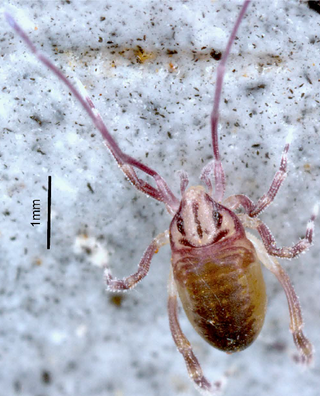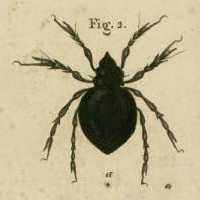
Parasitiformes are a superorder of Arachnids, constituting one of the two major groups of mites, alongside Acariformes. Parasitiformes has, at times, been classified at the rank of order or suborder.

Opilioacaridae is the sole family of mites in the order Opilioacarida, made up of about 13 genera. The mites of this family are rare, large mites, and are widely considered primitive, as they retain six pairs of eyes, and abdominal segmentation. They have historically been considered separate from other mites belonging to Acariformes and Parasitiformes, but are now generally considered a subgroup of Parasitiformes based on molecular phylogenetics.

The peacock mites of the genus Tuckerella are a significant herbivorous pest in the tropics, for example on citrus fruit. Other species dwell in grasses, possibly as root feeders.
Antennoseius is a genus of mites in the family Ascidae. As of 2021, it comprised 59 species mostly in subgenera Antennoseius and Vitzthumia, as well as six species not assigned to a subgenus.

Rhinonyssidae is a family of mites in the order Mesostigmata. There are about 16 genera and at least 460 described species in Rhinonyssidae.
Charadrinyssus is a genus of mites in the family Rhinonyssidae. This genus has a single species, Charadrinyssus charadrius.
Larinyssus is a genus of mites in the family Rhinonyssidae. There are about five described species in Larinyssus.
Locustellonyssus is a genus of mites in the family Rhinonyssidae. There are at least two described species in Locustellonyssus.
Passeronyssus is a genus of mites in the family Rhinonyssidae. There are about five described species in Passeronyssus.
Rallinyssus is a genus of mites in the family Rhinonyssidae. There are about 12 described species in Rallinyssus.
Rhinoecius is a genus of mites in the family Rhinonyssidae. There are about 12 described species in Rhinoecius.
Rhinonyssus is a genus of mites in the family Rhinonyssidae. There are more than 30 described species in Rhinonyssus.
Ruandanyssus is a genus of mites in the family Rhinonyssidae. There are at least three described species in Ruandanyssus.
Trochilonyssus is a genus of mites in the family Rhinonyssidae. This genus has a single species, Trochilonyssus trinitatis.
Tyranninyssus is a genus of mites in the family Rhinonyssidae. There are at least four described species in Tyranninyssus.
Zumptnyssus is a genus of mites in the family Rhinonyssidae. This genus has a single species, Zumptnyssus buboensis.

Syringophilidae is a family of mites, commonly known as quill mites. They are obligatory ectoparasites of birds, and inhabit their feather quills where they feed on subcutaneous tissue and fluids. Typically the Syringophilinae inhabit all but the body feathers, while the Picobinae specialize in infecting the body feathers internally. Quill mites have been recorded from hundreds of bird species, belonging to 95 families and 24 orders. Much knowledge of their hosts, diversity and systematics has been obtained since the late 1990's, but as of 2020 these were still considered to be poorly known.

Belba is a genus of mites belonging to family Damaeidae. The genus was established by Carl von Heyden in 1826. Notaspis corynopus was the type species. Species that are part of the genus can be found in Eurasia and North America.
Charletonia is a genus of mites belonging to the family Erythraeidae.
Guntheria coorongensis is a species of mite in the family Trombiculidae, found from the tip of Cape York in Queensland to South Australia.





